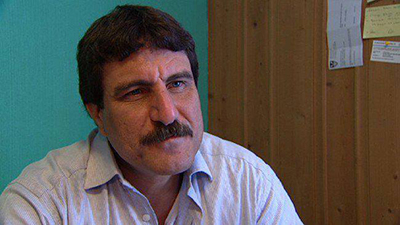When Ibtisam Alnawaty last spoke to her husband, Moheeb Alnawaty, in January 2011, there was nothing to suggest that he feared for his safety. The Palestinian-Norwegian writer had traveled to Syria in December 2010 to translate his book, Hamas From The Inside, and had even suggested the family should move there from Norway, his wife told CPJ. But on January 5, 2011, Moheeb Alnawaty’s phone was turned off and he has not been in contact since.
The circumstances that led to Moheeb Alnawaty’s disappearance are unclear. Reports filtered to his family and colleagues that he was in Syrian government custody. The Syrian foreign ministry confirmed to a Norwegian diplomat in 2013 that he was being held over accusations of spying for Israel, according to Eva Stabell, of the Norwegian Union of Journalists, and news reports. To date, the Syrian government has not allowed anyone to speak directly with Moheeb Alnawaty to confirm his health, status, and whereabouts, his wife told CPJ.
Ibtisam Alnawaty told CPJ that the spying accusation was baseless. She believes her husband was arrested in retribution for his critical writing. Her claim is plausible in Syria, the world’s sixth leading jailer of journalists in the world with at least 12 journalists in prison as a result of their work.
In his 2002 book, Hamas From The Inside, Moheeb Alnawaty had discussed sensitive topics including splits within the Hamas leadership and its funding, based on his interviews with members of the group and other sources. Fearing for his safety after Hamas seized power in Gaza, Moheeb Alnawaty fled to Norway in 2007, where he was granted asylum and eventually citizenship with his family.
His book and other writing are critical but it is not clear which passages would have put him in danger nearly a decade after their publication, or whether his arrest is connected to his writing. Because CPJ cannot confirm the reason behind his arrest, Moheeb Alnawaty has not appeared on CPJ’s annual census of journalists imprisoned for their work.
When Moheeb Alnawaty arrived in Syria, Damascus was home to the political headquarters of Hamas, and the movement had close relations with the Syrian government as part of what it called an axis of resistance against Israel, which stretched from Iran through Syria and Lebanon into the Gaza Strip. At the time, Syria was untouched by the violence that has consumed the country since 2011. It would have been hard to imagine that a peaceful protest movement would spark a brutal crackdown and eventual civil war. But a few months after Moheeb Alnawaty’s disappearance, that is exactly what happened. The civil war strained relations between the Syrian government, its patron Iran, and Hamas, which as a Sunni movement faced increasing pressure to support the Syrian opposition against its allies in the resistance against Israel. In early 2012, Hamas finally moved its political headquarters to Doha in Qatar, according to news reports.
But if he was arrested for his critical writing on Hamas, and if the Syrian war has severely strained the government’s relationship with the movement, why is Moheeb Alnawaty still in custody? Ibtisam Alnawaty told CPJ that she doesn’t know the answer.
“He is oppressed just like the Syrians themselves, but why he hasn’t been released, I don’t know,” she told CPJ.
It’s an answer all too familiar for the families of Syrian journalists who have disappeared into Syria’s Kafkaesque security system. Many of the journalists imprisoned by the government have not been heard from since their arrests, including Osama al-Habaly who disappeared more than two years ago at the Lebanese-Syrian border. Some remain imprisoned for unknown reasons, like blogger Tal al-Mallohi who was ordered by a court in October 2013 to be released and yet remains in custody. Others have been dragged from postponed court session to postponed court session without any hope of a fair and speedy trial, as in the case of three members of the Syrian Center for Media and Freedom of Expression who have been held since 2012.
Underlying the uncertainty over the legal status of all these cases is the legitimate fear for their safety in custody. There are widespread and credible claims of torture in President Assad’s prisons. At least three journalists have died while in government custody, and two of their families and local rights groups said they were tortured.
In the case of Moheeb Alnawaty, if he is still being held by the Syrian government, the hope is his Norwegian citizenship may offer some protection, however slight. It is the smallest of concessions for the Syrian government to admit to his detention, but it is a concession the government often does not afford to its own citizens. The Norwegian government, as well as Palestinian authorities, should continue to push for due process. Such international pressure has led the Syrian government to free other international journalists, including the Germans Billy Six and Armin Wertz.
Short of releasing Moheeb Alnawaty, the Syrian government should allow him consular access, a right stipulated in the Vienna Convention on Consular Relations, and publicly disclose evidence for its espionage accusation in a fair and speedy trial. At the very least, the government should allow him to call his wife.
Moheeb Alnawaty’s absence has been felt by his six children, with his 15-year-old daughter Maysara expressing hope that they will soon be reunited. In a January 5 post on her public Facebook page, she wrote in Arabic: “My beloved daddy: Today has been four years that we haven’t heard your voice or any news from you. Four years that have gone so slowly without you … Four years that have gone by unjustly.”
